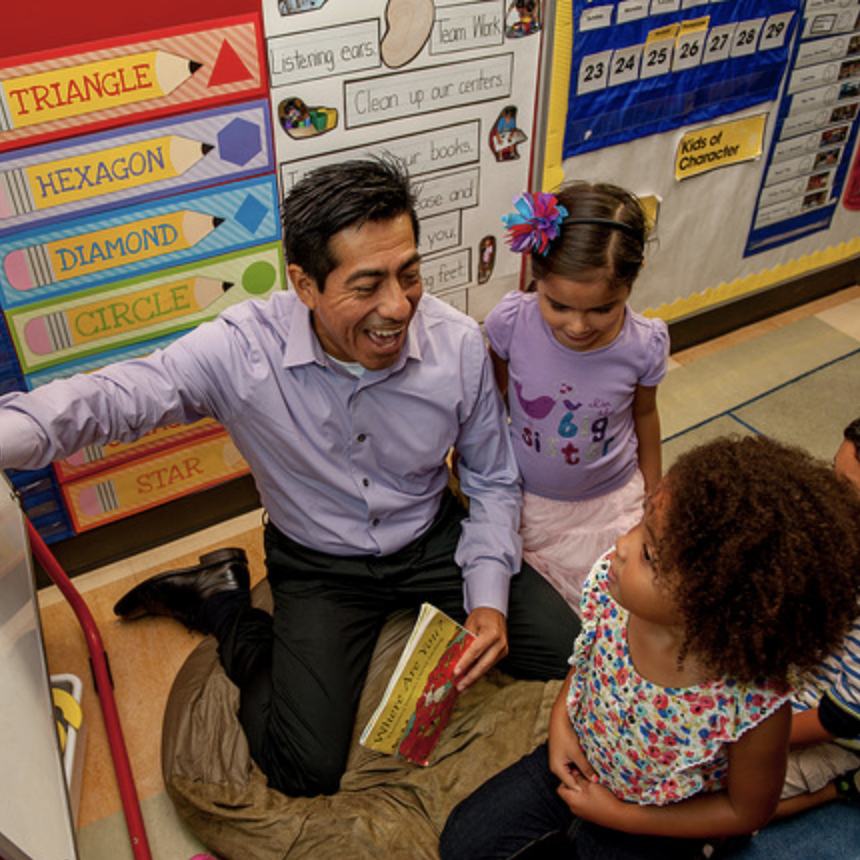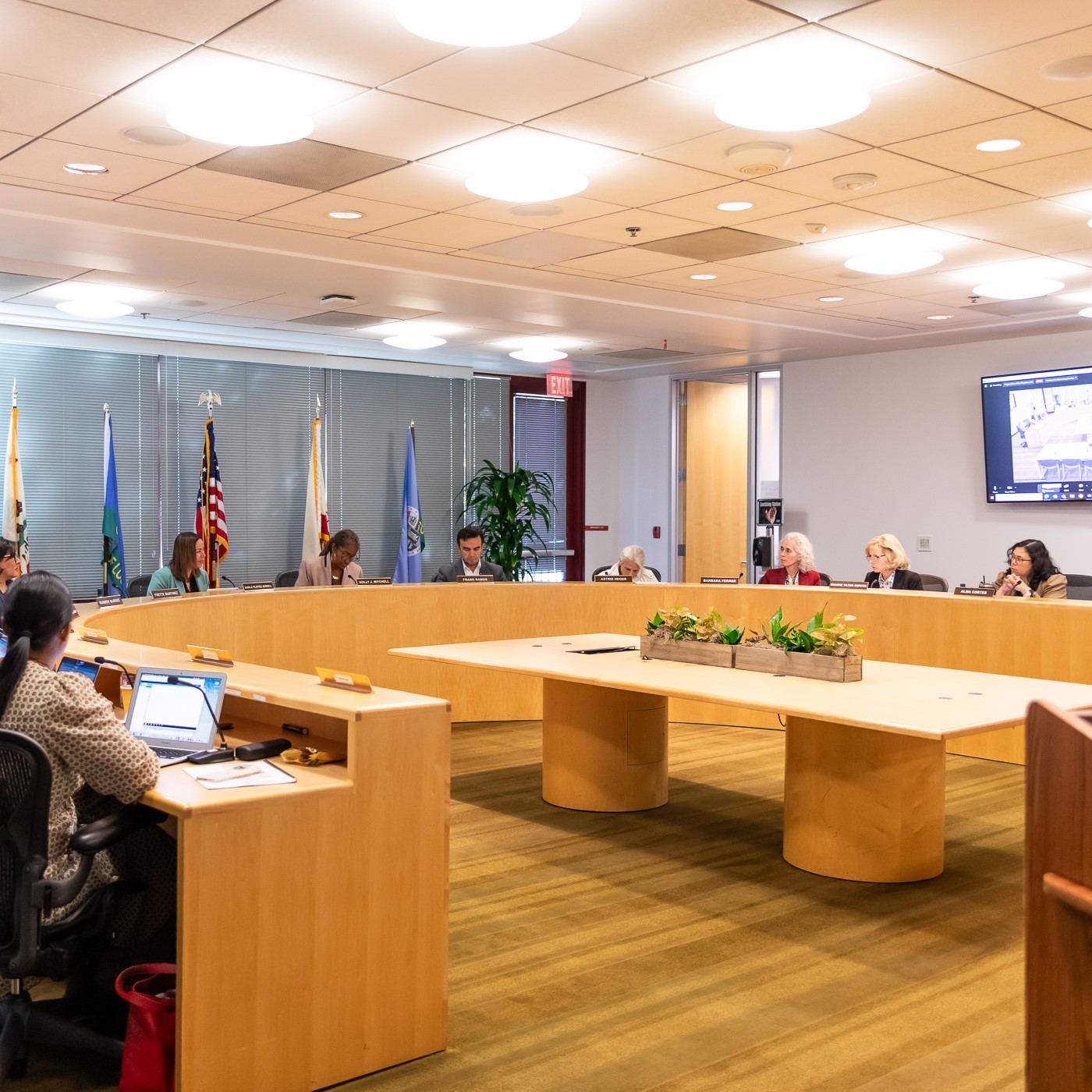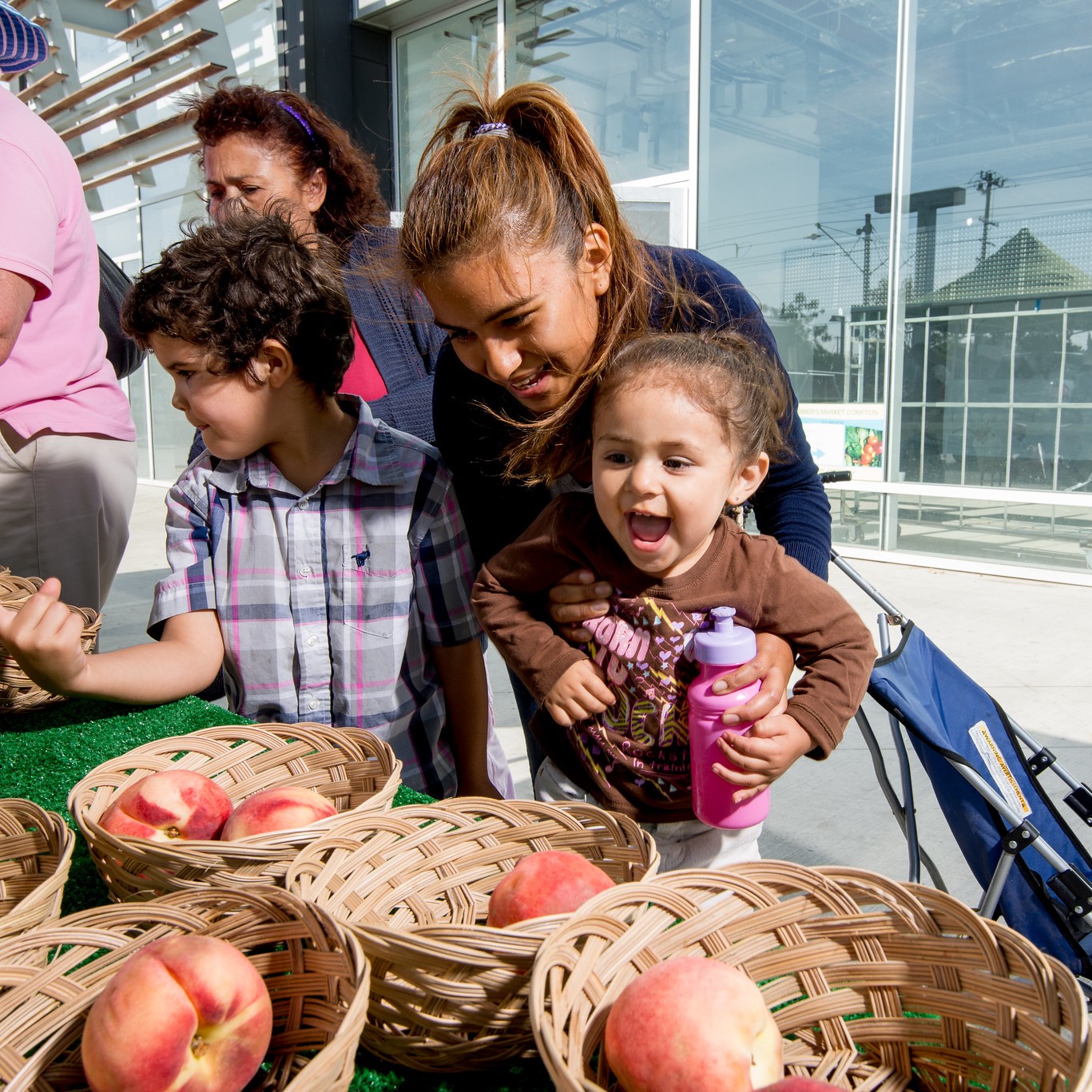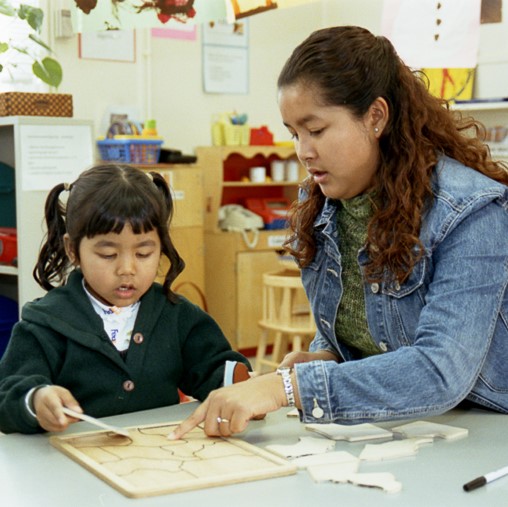“Let us sacrifice our today so our children can have a better tomorrow.” – A. P. J. Abdul Kalam, Indian scientist and statesman
Few people sacrifice more of their waking hours for the young children of East Los Angeles than Justine Flores.
Rising before the break of dawn each weekday, she prepares her small, three-bedroom peach-colored home to welcome the dozen children — from newborns to preteens — who come through the doors of Flores Family Child Care. They stay until their parents return from work, often after dark.
Then, when most other parents are resting over the weekend, Flores heads out to her other job.
The one she works just to keep her child care doors open.
“I work Saturday and Sunday as a nurse to pay for this,” she said. “Ninety percent of the funding for the center comes from me.”
 Even then, Flores said, it is not always enough. After paying the wages of her part-time child care workers and other expenses like curriculum materials, supplies and playground improvements, Flores averaged $1.25 an hour last year, she said.
Even then, Flores said, it is not always enough. After paying the wages of her part-time child care workers and other expenses like curriculum materials, supplies and playground improvements, Flores averaged $1.25 an hour last year, she said.
“There are days I have to choose between providing enough food for my family and the kids in my care,” she said.
Flores represents a single snapshot in the album of life experienced by early care and education (ECE) providers in L.A. County. The balance between making ends meet and ensuring quality care is a challenge faced by many of approximately 10,000 licensed child care providers like Flores, who are serving tens of thousands of young children countywide.
But they are not alone. Along with its partners, First 5 LA is making great strides towards policy and systems change to improve access to quality care, increase provider rates, train the ECE workforce and other efforts aligned with its North Star: that by 2028 all children in L.A. County enter kindergarten ready to succeed in school and life.
Specifically, First 5 LA’s 2015-2020 Strategic Plan includes targeted ECE outcomes such as establishment of a countywide Kindergarten Readiness Assessment (KRA); strengthening and expansion of a countywide Quality Rating and Improvement System (QRIS); development of a sustainable ECE Workforce Registry; establishment of a California early childhood teaching credential; strengthening the early educator professional development system; and policy and advocacy work to prioritize access to quality ECE at the local, state and national levels.
New Learnings in Kindergarten Readiness
Just this fall, First 5 LA unveiled the results of the first batch of kindergarten-readiness data collected for 6,506 children in seven school districts and communities during the first part of 2018. Representing about five percent of the total kindergarten student population in L.A. County, the data was collected using the Early Development Instrument (EDI) tool, which provides insight into young children’s developmental readiness for kindergarten, and also highlights population-wide vulnerabilities in five domains including social competence, emotional maturity, language and cognitive skills, communication skills and physical health and well-being.
Administered by kindergarten teachers three to six months after a child entered kindergarten, the first data collection effort was conducted during the spring 2018 semester. It was approved by the First 5 LA Board in October 2017 and is part of First 5 LA’s Kindergarten Readiness Assessment (KRA) Initiative.
The data can reveal developmental vulnerabilities across specific neighborhoods within the same school district. For example:
- While 63 percent of Santa Monica kindergarten students were developmentally on track among all five domains, approximately 7 percent of students were vulnerable in the Emotional Maturity domain
- Of the 51 percent of kindergarten students in El Monte who were not on track among all domains, the majority of students were vulnerable in the Language and Cognitive Development domain
- 11 percent of kindergarten students in the city of Pasadena were vulnerable in the Social Competence domain

School districts and communities have received their 2017–18 EDI results and are planning articulation meetings between early education centers and the K–12 system in order to focus on better and more streamlined alignment.
“It’s not just about collecting data, but helping school districts and communities identify and address these vulnerabilities among young children and engage teachers, community members and other stakeholders to develop program strategies and local policies to target improvement,” said First 5 LA Early Care and Education Program Officer Avery Seretan.
“Quality early education is a priority for Pomona Unified School District (PUSD) and one which we believe is aligned with our long-term goals of building a robust pipeline from Pre-K to college,” said Richard Martinez, superintendent of PUSD, which participated in the data collection. “EDI gives us an opportunity to view data holistically, to find new patterns and trends that can lead us to new insights. This, in turn, allows for PUSD to engage our community partners in a new way around data that is mapped to describe how our young children are doing developmentally and to help identify the need gaps for our youngest children.”
“Ensuring that our youngest learners enter kindergarten ready to succeed is one of the smartest investments we can make,” said David Rattray, executive vice president of the Los Angeles Area Chamber of Commerce. “We also need to better understand what those elements are that make children thrive, and how we can replicate them across the county to create more supportive learning environments for all children. A countywide Kindergarten Readiness Assessment, such as the EDI, can help us get there. In practice, the EDI provides communities with data to advocate for change and it also provides policy makers and program administrators with a system to track progress in early childhood programs, investments and policy. We cannot have the skilled workforce of tomorrow without making informed investments in the systems that support today’s youngest learners.”
With a new strategic partnership with Compton Unified School District and Lowell Joint School District approved by the First 5 LA Board in November — plus expanded data collection with the Los Angeles Unified School District — the data collection efforts will grow to encompass 14 percent of all L.A. County kindergarteners in 2018–19.
And that’s just the beginning.
High Marks for Quality
According to one statewide poll, six out of 10 California voters favor increasing state funding to ensure that all children have access to quality ECE programs. At the same time, research supports the effectiveness of a Quality Rating and Improvement System (QRIS) — a system to assess, rate, improve and communicate the quality of early care and education sites.
Yet, while a number of organizations and agencies in L.A. County had a long history of work in the QRIS arena, the work was fragmented. Four years ago, a new effort began to bring all the relevant partners to the table, identify common goals, learn from collective experiences and develop a cohesive approach to implementing a QRIS system throughout L.A. County.
The result was the formation of Quality Start Los Angeles (QSLA), a voluntary Quality Rating and Improvement System (QRIS) designed to help parents of children birth to 5 choose the best early childhood education for their family by helping parents understand what makes an early learning program effective. Key QSLA partners include the Los Angeles County Office of Education (LACOE), Child 360, Child Care Alliance of Los Angeles, Office for the Advancement of Early Care and Education, and First 5 LA.
QSLA is maximizing the success of children and their families at participating early learning sites across L.A. County by supporting the professionals from licensed centers and family child care homes in the continuous improvement of their programs. ECE providers who participate in QSLA receive access to technical assistance, professional development, program coaches, program leadership consultants and family engagement specialists.
“Since QSLA’s inception, we have seen a tremendous increase of the number of rated sites in L.A. County. Currently, we have reached over two-thirds of California State Preschool Programs in the county,” said First 5 LA Early Care and Education Program Officer Kevin Dieterle. “Perhaps more importantly, we know from our program evaluation efforts that sites opt to enroll in QSLA to enhance the quality of their programs and to receive coaching and technical assistance from QSLA staff.”
As of June 30, QSLA has rated 859 sites (center-based and home-based) serving 43,660 children. Of these children, 3 percent are infants, 11 percent are toddlers and the remaining 87 percent are preschool-aged children. In addition, over the past year there has been an increase in fully rated QRIS sites (+208 centers, +16 homes).
QSLA recently launched the test phase of its QRIS model, which will be accompanied by a 20-month evaluation beginning in November that will provide an opportunity to refine the model before going to scale.
First 5 LA Commissioner Keesha Woods is uniquely positioned to see the payoff from the years of collaboration between the many QSLA partners, as she also serves as executive director of LACOE’s Head Start and Early Learning Division.
“We’ve come a long way in the last four years. With both First 5 LA and LACOE being central leaders in the ECE system, it’s important that we show how to partner and how to put in resources so we’re all forging a quality system for kids,” Woods said. “For kids, my vision is that we have the best-qualified and most-skilled providers. If we have qualified providers, that translates into gains for kids.”
 Elevating ECE Skills Through Competencies
Elevating ECE Skills Through Competencies
Speaking of qualified and skilled providers . . .
. . . in order for early childhood educators to be able to provide quality care to young children and their families, the California Department of Education (COE) and First 5 California began in 2008 to develop the California Early Childhood Educator Competencies to describe the skills, knowledge and disposition needed by providers to support children’s optimal development and learning.
Formally released in 2011 by the COE, the Competencies are organized into 12 overlapping areas: (1) Child Development and Learning; (2) Culture, Diversity and Equity; (3) Relationships, Interactions and Guidance; (4) Family and Community Engagement; (5) Dual-Language Development; (6) Observation, Screening, Assessment and Documentation; (7) Special Needs and Inclusion; (8) Learning Environments and Curriculum; (9) Health, Safety and Nutrition; (10) Leadership in Early Childhood Education; (11) Professionalism; and (12) Administration and Supervision.
Launched by First 5 LA in September, the Early Childhood Educator Competencies Initiative seeks to strengthen the early learning professional development system by integrating the research-based Early Childhood Educator Competencies into L.A. County training programs.
The two-year project will support ECE professional development organizations as they enhance and align training efforts provided outside the higher education system.
Seven organizations were selected to each receive a $140,000 Early Childhood Educator Competencies professional development grant: Girls Club of Los Angeles, Institute for the Redesign of Learning, Baldwin Park USD-ECE, Los Angeles County Office of Education (LACOE), Pacific Asian Consortium in Employment (PACE), Crystal Stairs and the Child Care Resource Center (CCRC).
Grantees will receive support by participating in peer learning activities, a learning institute and coaching led by the Child Care Alliance of Los Angeles, which received a $360,000 grant to serve as the training and technical provider for Early Childhood Educator Competencies.
Fiona Stewart, Child Care Alliance of Los Angeles program director, praised First 5 LA for recognizing both the importance and challenge of integrating the Competencies into the preparation and professional development of the ECE workforce in real and meaningful ways.
“First 5 LA has stepped up and provided the opportunity and the resources needed for professional development agencies to work in partnership to learn together and share ideas and best practices,” Stewart said. “By supporting the time to think together and co-design approaches to integrating the competencies, First 5 LA makes progress towards greater system-level change in the ECE professional development landscape possible.”
Building Partnerships that Work . . . Together
As First 5 LA’s Strategic Plan notes, “Addressing the challenges faced by today’s families is a big task; we can’t, and shouldn’t, do it alone. We are just one of many organizations in this large county that are working to improve the lives of children and families.”
To this end, First 5 LA has helped grow a network of partners into coalitions that are advancing key issues, both locally and statewide. Recent highlights include:
The Los Angeles Family Child Care Providers United (LAFCPU) alliance is growing fairly rapidly: since its formal inception in early 2018, it has expanded to more than 40 family child care providers in the county, with up to 20 providers attending monthly meetings.
Funded by First 5 LA to promote shared services, this alliance has worked together to share professional development; train providers on marketing their child care business; ensure full reimbursement from the state child care subsidy system; work with children with special needs; and increase access to curriculum enrichment such as STEAM.
“The LAFCPU alliance is significant in that overall we see a decline in family child care providers across L.A. County,” said First 5 LA Early Care and Education Program Officer Gina Rodriguez. “As an alliance, they are able to create a network to share resources, devise a referral system for families, create a substitute-pool system among themselves, and decrease isolation as a family child care business. Shared services then becomes a strategy for their sustainability.”
Partnerships for Education, Articulation and Coordination through Higher Education (PEACH) is advocating at a state level on the issue of Teacher Performance Expectations (TPEs) for early childhood educators.
PEACH is a higher education collaborative of ECE and child development faculty from colleges and universities working to strengthen the preparation and career pathways in the ECE field. PEACH is currently comprised of representatives from over 20 campuses including two-thirds of the L.A. County community colleges, all of the L.A. County California State University (CSU) campuses, three private universities and UCLA Education Extension Early Childhood Education Program.
In partnership with First 5 LA, PEACH leads the ECE Credential Advocacy Project, which increases access to quality ECE by supporting 1) the modification and implementation of the Child Development Permit Matrix and 2) the development and implementation of an ECE Credential, a professional credential for teachers who work with children 0–8 years old. A key piece of this work is preparing the higher-education system to support these policy-level changes and the increased qualifications they will require.
Most recently, First 5 LA and PEACH have been active this fall in Sacramento, where the California Commission on Teacher Credentialing (CTC) is in the process of developing the first-ever Teacher Performance Expectations for early childhood educators.
“First 5 LA is partnering with PEACH to ensure that the new state TPEs for the early care and education field are aligned with the California Early Childhood Educator Competencies,” said First 5 LA Early Care and Education Program Officer Jaime Kalenik. “This work includes making public comment at CTC meetings, participating on advisory committees to CTC staff and elevating feedback from the L.A. County ECE community about the knowledge, skills and disposition that early educators need to provide quality care to young children and their families.”
These TPEs will guide the CTC as it works to revise the Child Development Permit, the current state certification available to ECE providers, and will be an important building block for any future ECE credential, Kalenik said. The CTC will vote on draft TPEs at its February 2019 meeting.
Click here for a separate article highlighting recent news on the issue of educating and compensating providers.
 Advocacy and Opportunity
Advocacy and Opportunity
If recent developments in Sacramento and at the ballot box are any indication, there has not been a more opportune time for First 5 LA as an advocate, innovator and collaborator to garner support to address many of the most pressing early care and education issues.
Advocacy efforts by First 5 LA and its partners within the statewide Early Care and Education Coalition have made an impact among Sacramento lawmakers, who approved a $900 million increase in new early-learning investments in the 2018–19 state budget. By funding an additional 13,400 child care slots and 2,947 preschool slots, these increases will immediately improve access to early care and education opportunities for California families with young children.
The election of incoming governor Gavin Newsom — whose campaign agenda included universal preschool and child care — presents a rare moment of opportunity for early childhood advocates, said First 5 LA Director of Early Care and Education Becca Patton.
“$900 million is a good down payment on supporting our youngest children, but we need to fulfill the promise of ensuring that the families most in need receive the services for which they are eligible,” Patton said. “There are over a million children still waiting for child care services, and we want to ensure that there is a plan to serve all of these children in the next eight years, starting with those most in need.”
Finding Common Ground . . . and a Ray of Hope
For her part, Flores found a ray of hope during a September visit to the nearby Mexican American Opportunity Foundation (MAOF) Ford Center child care site in East L.A., where she and other child care providers met with Assemblywoman Wendy Carrillo (D–Los Angeles).
During the visit arranged in part by First 5 LA, Carrillo (who was profiled in last month’s newsletter) took a brief tour of the child care site and heard about the challenges faced by providers and parents alike in a community where 36 percent of children ages 3 to 5 are not enrolled in preschool or kindergarten. Access and affordability are among the reasons:
- More than 1 million children statewide are qualified for subsidized ECE, yet just 33 percent are served
- The average child care cost for two children under age 5 would consume 42 percent of the income of a family at the income eligibility threshold
- Only 1.8 percent of California’s budget goes to subsidized child care and preschool
Then there was the issue of waiting lists for quality care. Flores herself spent two years on a waiting list at MAOF before receiving child care in order to pursue her early childhood development degree. Now that she runs a child care center, her own waiting list has 145 children.

Carrillo, a first-year lawmaker elected last November, found common ground with Flores at the MAOF center. Like Flores, Carrillo’s mother went through the MAOF program to become a child care provider. Carrillo’s mother later used that training to become a teacher’s assistant at an elementary school.
Carrillo listened intently as Flores shared her struggles working weekends to finance her child care business, as well as paying more than $2,000 out of her own pocket for a high-quality creative curriculum.

“We want to teach these children,” said Flores, who noted that every young child leaves her center for preschool being able to speak English and Spanish as well as perform sign language. “We don’t just want to put them in front of the TV.”
“This was an insightful look,” Carrillo said after the tour and meeting with providers. She added that she would spend additional time learning “more about how things work, and how I can help.”
The encounter with Carrillo served as an inspiration to Flores. In the months since, she has elevated her own advocacy efforts, reaching out to other state representatives as an MAOF Ambassador. She and a group of other early learning providers even met with Gavin Newsom the week before he was elected Governor.
“He gave us his word he would fight for changes in child care,” Flores said. “I can see that some things are finally changing.”








